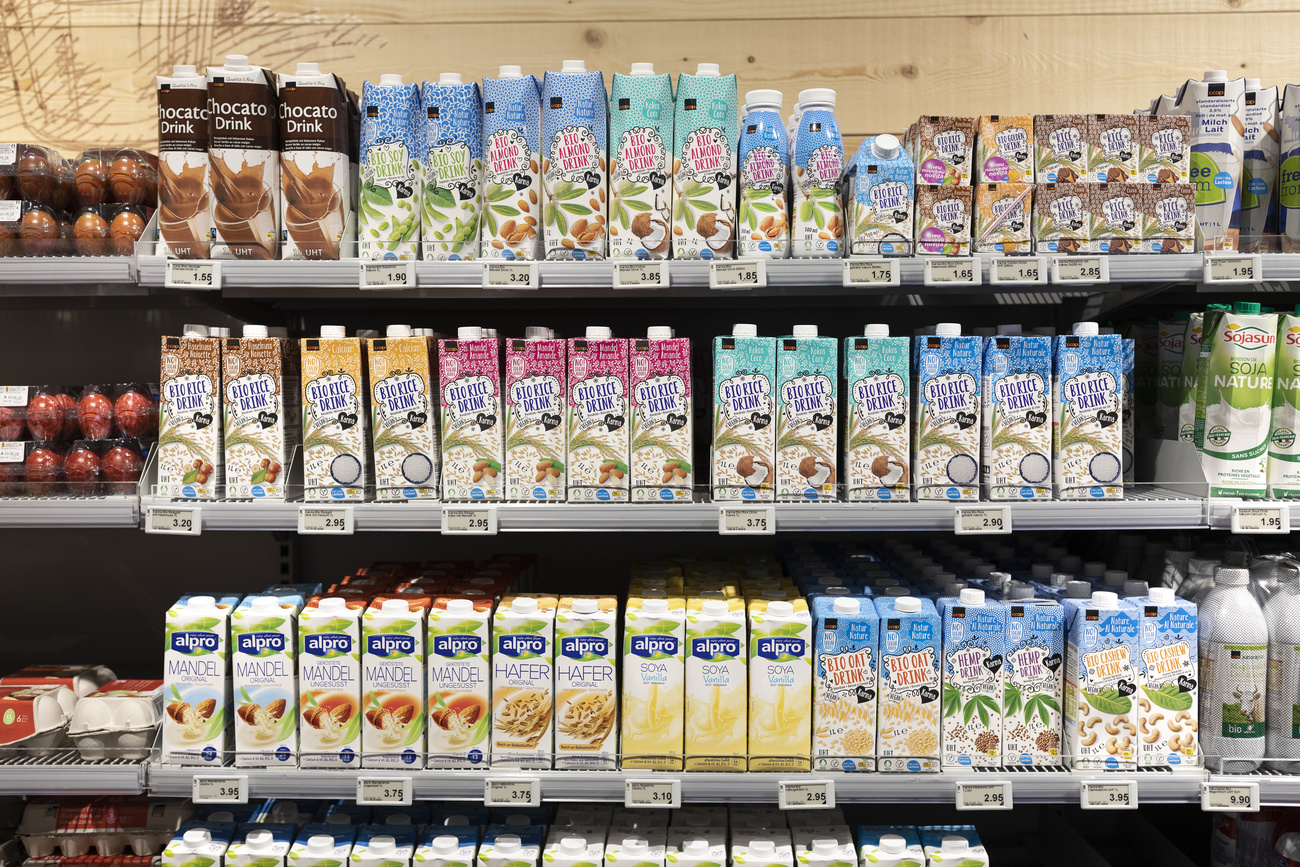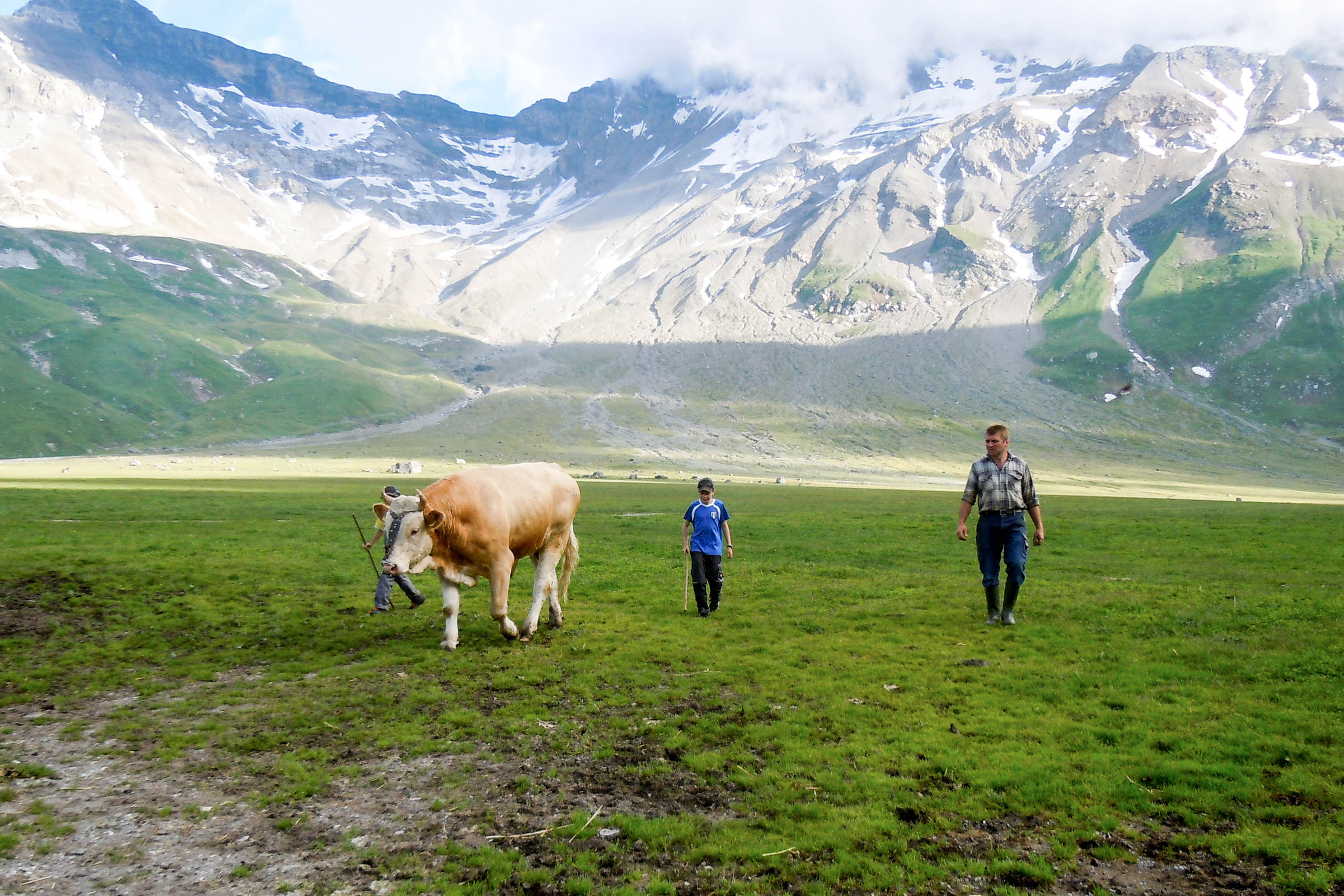‘Animal milk remains Emmi’s passion and core business’

Ricarda Demarmels, the new CEO of Swiss dairy giant Emmi, is confident that plant-based alternatives will not replace animal milk. She also intends to focus on four strategic products in four specific countries. SWI swissinfo.ch interviewed her at the company’s headquarters in Lucerne.
Demarmels, who hails from canton Graubünden in eastern Switzerland, took over the helm of the Emmi Group in January 2023. Over the first months many people watched her every step closely – for the leading Swiss dairy manufacturer had had a shaky 2022 with several operational challenges, including a serious hitch with a new central warehouse in Chile.
The dairy group employs 9,000 people, around 70% of whom work outside Switzerland in 14 countries. The group markets its products in some 60 countries and manufactures them at more than 50 of its own production sites in 11 countries. The group has been listed on the Swiss stock exchange since 2004 and posted sales of CHF4.2 billion ($4.7 billion) in 2022 (+8.1% year-on-year).
Between January and June 2023, Emmi’s sales rose by 4.3% year-on-year to CHF2.1 billion, exceeding analysts’ forecasts.
SWI swissinfo.ch: You took over as the CEO of Emmi in January 2023. How have the first months been?
Ricarda Demarmels: I’ve been working for Emmi for four years now, and my honeymoon with this company and its culture continues to this day. At Emmi, everyone pulls together and our entrepreneurial spirit has enabled us to achieve incredible growth over the past 20 years. Our brands are strong and our product range is attractive. In other words, I’ve taken over the management of a company in a very enviable position.
SWI: What changes have you made?
R.D.: My colleagues and I share the same overriding goal: to build on the positive momentum, placing the company that we all serve – and not the executive management – at the heart of our concerns and action. Since the start of the year we have worked hard to regain the ground lost last year in a tough environment. And the results so far have been very encouraging. We are well on track to meet our objectives for this year and beyond. In the longer term, we also want to improve our product range steadily.
SWI: Let’s talk about your product range. Is it not too broad?
R.D.: Our approach is to concentrate on our profitable and strategic segments. We’re therefore focusing on four “strategic niches”: ready-to-drink coffee, specialty cheeses, premium chilled desserts and plant-based dairy alternatives. This helps explain why we recently divested the Germany-based dairy producer Gläserne Molkerei.
SWI: Your company is still relatively diversified. Does this hinder your sales growth and profitability?
R.D.: Our increasingly connected world has become extremely volatile. I’m thinking, for instance, of the recent pandemic, sudden inflation and tensions between eastern and western Europe. We’re constantly having to put out at least one fire, whether caused by external factors or of our own doing.
Fortunately, our corporate culture and decentralised business model enable us to react very fast. Our relatively broad diversification – be it in terms of our products, our distribution channels, our price levels or geographical presence – also guarantees a certain stability. This stability is a real plus, even if it does slow our growth and profitability somewhat.

SWI: What about your new plant-based products?
R.D.: We’ve been manufacturing plant-based products for over 20 years now. We launched the Beleaf brand in Switzerland and the Begetal brand in Spain. We have also strengthened our position in this field through acquisitions.
Nevertheless, milk of animal origin remains Emmi’s passion and core business. With our alternatives to dairy products, we are meeting a demand, for example in Switzerland. As a result, we’re not leaving our shelves to foreign suppliers. Our products made from Swiss oats also give work to local farmers.
SWI: Is there a risk of cannibalisation between your plant-based and your dairy products?
R.D.: Our plant-based products currently represent less than 1% of our total sales. So I see limited risk of cannibalisation. In any case, milk will always remain an important part of our nutrition, because it is a natural food that is rich in nutrients. These qualities are clearly illustrated in the food pyramid.
SWI: Do you prefer to export or to produce abroad?
R.D.: We combine the two. Historically, we started out exporting our products from Switzerland. Since our listing on the Swiss Stock Exchange in December 2004 we have continued to expand internationally, strengthening our position in local markets outside Switzerland through 42 transactions. Today, thanks to our foreign-based entities, our international growth can accelerate organically.
SWI: Your products are distributed in 60 countries. Would you like to boost your sales in major markets such as Japan and China?
R.D.: Our group’s management recently held in-depth discussions on this matter. We concluded that we should build on our strengths. Our strategy is therefore to focus primarily on four markets – Switzerland, the United States, Chile and Brazil – and four product categories, as mentioned above.
SWI: Are your foreign sales more profitable than your operations in Switzerland? This information isn’t in your annual reports.
R.D.: Profitability depends above all on the product categories, not on geographic markets!
SWI: Over 60% of your shareholders are Swiss dairy farmers. Do their interests align with those of the large US funds, which are also among your shareholders?
R.D.: As I see it, all our shareholders want Emmi to build on the successes of the past two decades, and for it to do so for many years to come.
Edited by Samuel Jaberg. Translated from French by Julia Bassam.

In compliance with the JTI standards
More: SWI swissinfo.ch certified by the Journalism Trust Initiative












You can find an overview of ongoing debates with our journalists here . Please join us!
If you want to start a conversation about a topic raised in this article or want to report factual errors, email us at english@swissinfo.ch.